- Home
- Brandon Mull
The Candy Shop War, Vol. 2: Arcade Catastrophe Page 7
The Candy Shop War, Vol. 2: Arcade Catastrophe Read online
Page 7
Trevor clapped his hands together and rubbed them. “If we’re here for tickets, we should get started.”
“Should we use the gum?” Summer asked.
They had each set out that morning with two sticks of Peak Performance gum. Nate had used one of his, but Pigeon had given up his two before they separated, so Nate now had three.
“Might as well,” Nate said, pulling out a stick of gum.
Trevor and Summer did likewise.
“We should make the most of it,” Nate instructed. “Split up, play fast. Try not to wait in line. We’ll only get the full effect for fifteen minutes or so.”
“The effect will get weaker the more gum we use,” Summer mentioned.
“True,” Nate said. “Mr. Stott has been trying to make the effect more stable, but the results still shrink the more sticks you chew. Do the trickiest stuff first.”
“Where are you going to start?” Summer asked Trevor.
“I want to break Nate’s basketball record.”
“I’ll stay here and nail targets,” Nate said.
“I’ll go try Shooting Stars,” Summer said.
“There might not be enough skill to it,” Nate warned. “It could be all luck.”
Summer shrugged. “I’ll find out soon enough.” She stuck the gum in her mouth. “I’ve always liked the games where you have to stop the lights in the right spot.”
Nate put the stick in his mouth and started chewing. He had given his tokens to Trevor. Summer had one of his cards with token credits. He had the other. He swiped it and picked up the rifle Roman had been using.
Nate aimed through the window at the circling vultures. The targets seemed absurdly easy to hit. On his first turn, he practiced aiming for different parts of the targets, and found that his rifle shot slightly down and to the left from where he aimed. It wasn’t misaligned enough to miss when pointed at the center of a target, but might be enough to mess up the tiny winking star and the engine window shot.
On his next turn, Nate lit up the four buzzards and the four train cars with casual effort. Then he waited for the star and shot when it appeared. The pinprick of light briefly glared red, which it had not done before, convincing him that he had hit it.
The next time the train came by the other window, Nate sighted barely up and to the right of the engine window. When he squeezed the trigger, every target in the shooting gallery flashed. The piano guy started playing, the raccoon peeked out of the honey pot, the bottles spun, the pans clattered, the rattlesnake rattled, the turtle flipped over, the bear trap snapped shut, and all the other movable elements came to life in a burst of motion, light, and sound.
A siren was wailing. Tickets were unspooling. Evidently Chris had been right about a bonus for hitting all ten targets on a single turn.
A man came up to Nate and clapped him on the shoulder. The man had dark, neatly carved sideburns that widened as they got lower. He wore tinted glasses, western boots, blue jeans, and a button-down cowboy shirt with banjoes embroidered on the front. “How’d you know to do that, son?” he murmured, almost making it an accusation.
“I heard a rumor.”
“Who taught you to shoot like that?”
“I was raised by mountain lions.”
The man gave him skeptical look, followed by a slow smile. “You got a name?”
“Nate.”
“I’m Cleon. You just won a whole mess of tickets. Saving up for anything special?”
“Maybe.”
Another siren went off over by the basketball hoops. Cleon turned to face the pulsing light. “Basketball? That record was up in outer space today!”
A new siren went off in the middle of the game floor. Cleon’s jaw dropped. “You’ve got to be ribbing me! Shooting Stars too?”
“What’s going on?” Nate asked, trying to act confused.
“A storm of big winners,” Cleon said. “Uncanny. Have we been hacked or something? What exactly did you shoot?”
“All the far targets.”
“Including . . . ?”
“The buzzards, the train cars, the star, and the engine window.”
Cleon slapped Nate on the shoulder. “You should have 2,500 tickets coming your way. I’ll be back to make sure they all pay out. We’ve got a plague of winners all of a sudden.”
Cleon walked away toward the Shooting Stars machine. Nate waited as the endless strand of tickets emerged from the dispenser. He grabbed the long ribbon and started folding. A modest crowd had gathered to watch the tickets pay out.
By the time the machine had quit, Nate had a sense that all of the tickets were there. He regretted having to wait for them to unspool, since he knew the duration of the Peak Performance gum was limited.
Cleon returned and opened up the ticket dispenser. “There are still some left on the reel,” he announced. “This model only holds 4,000 at a time, so it must have been fairly full when you started. Congratulations.” He closed up the machine and strode away.
Tickets in hand, Nate went to find Summer. As he moved across the floor, the siren went off at the larger basketball game. Trevor had beaten his other record.
Nate found Summer feeding tickets into the counting machine. “I won in three tries,” she said. “The pattern is complicated but not impossible. Five thousand tickets!”
“That’s crazy,” Nate said. “Why waste time counting tickets? Peak Performance doesn’t last long.”
“I have a ton of tickets to drag around,” she said. “Lots of people crowded to see when I won. Won’t I be sort of obvious if I keep winning huge?”
“Who cares? We’re not breaking any rules. Did the jackpot lower after you won?”
“No. It stayed the same.”
“Take my tickets. I want to try before my gum wears off.”
Nate handed over his shooting gallery winnings and hurried to the Shooting Stars machine. A grid composed of hundreds of tiny bulbs twinkled impressively. Each bulb was either white, red, or off. The white lights swirled and cascaded in complex patterns. Among the white lights, ten red lights zipped through the pattern like hyperactive fireflies.
A horizontal line of ten bulbs in the middle of the grid was enclosed by a red rectangle. The rules explained that if you could freeze the display with the ten bulbs lit, you won a hundred tickets. If you could pause the grid while the ten center bulbs were red, you won the jackpot.
Even with his perceptions enhanced by Peak Performance gum, Nate could see that the center bulbs only glowed simultaneously for the briefest instant. And it would require patience, because all of the reds only gathered there roughly once per minute.
The young woman currently playing hit the button to pause the lights and trapped four white ones in the center rectangle. The machine gave her eight tickets.
When she stepped aside, Nate approached the machine. It required two tokens to play. Nate swiped his card. He watched the flashing pattern of lights, finger poised above the button that would halt them.
The reds were about to synchronize. He would have to get it just right. When he hit the button, all ten red bulbs froze, but there was a single bulb outside the rectangle. He realized that there was an infinitesimal delay between the pressing of the button and the stopping of the bulbs.
Nate swiped his card again and waited. Freezing white lights in the rectangle would be simple. But getting all the reds would be tough even with Peak Performance. He would have to hit the button a tiny bit early.
He saw the reds approaching. He hit the button, trapping ten red bulbs inside the rectangle. Sirens shrieked and lights flashed. Two ribbons of tickets began unreeling.
Cleon hurried over. “You again?” he asked, lowering his tinted glasses just enough to stare at Nate directly. “What is going on?”
“Quick reflexes?” Nate tried.
Cleon stepped close. Nate could smell his cologne. “You know we have security cameras? We’ll review your every move.”
“I’m glad,” Nate said. “You’ll se
e that I won fair and square.”
“Maybe,” Cleon said, hands on his hips. “But whatever trick you and your friends have discovered, you shouldn’t flaunt it so blatantly. We have lots of games here. It’s a fun place. But you’re here chasing something, and that is no game to us, you read me?”
Nate assumed he was referring to the stamps. “Will the machine deliver all my tickets?”
“It will this time,” Cleon replied. “This monster holds two reels of eight thousand each. But we’ll be shutting down Shooting Stars for the night for maintenance. Same with the shooting gallery. You might consider making an exit.”
Nate scrunched his eyebrows. “Are you throwing me out?”
Cleon shrugged. “I’m not going to haul you over and chuck you out the door, but the way I see it, you’ve already passed the point when you should have walked away. Might be about time to run.”
Cleon sauntered off. He returned as the tickets finished streaming out. Cleon shut down the machine, unplugged it, and hung an OUT OF ORDER sign. Nate met up with Summer and Trevor at the ticket tallying machine.
“All of these games seem super easy,” Trevor said. “I broke the record on the football one as well.”
“I won a couple more of the light games,” Summer said. “Smaller jackpots.”
“Has Cleon talked to you?” Nate asked.
“The guy with the sideburns?” Summer asked.
“He seemed suspicious of me,” Trevor said.
“Me too,” Nate said. “He basically told me to beat it.”
“Did you have to go win the biggest jackpot in the place right after me?” Summer asked.
“We’ve all been winning jackpots like it’s easy,” Nate said.
“It was easy,” Trevor muttered.
“But it shouldn’t be,” Nate replied. “We’ve drawn enough attention. Let’s save the rest of our gum and try again tomorrow.”
Nate was feeding his tickets into a machine. It speedily sucked up the long strips. He noted that they went in much more quickly than the other machines spat them out.
“Is it safe to come back here?” Trevor asked in a low voice. “Might have been dumb to win so much so quickly.”
“We know these guys can be dangerous,” Summer added.
“We’ll need to come ready for trouble,” Nate said. “But no way am I quitting the hunt for one of those stamps.”
Chapter Six
Lindy
Pigeon sat across from Mr. Stott in a back room of the candy shop, spooning mouthfuls of chocolate sludge out of a mug. Mr. Stott had invented the rich concoction, which was essentially chocolate milk with loads of chocolate and not enough milk. Though it was too sugary for some people’s taste, Pigeon loved to overdose on the potent treat.
“They’re there now?” Mr. Stott asked.
“That was the plan,” Pigeon said after swallowing. “Nate wanted to start earning tickets. I know him. He’s already determined to win a stamp. Once he sets his mind on something, he’s hard to stop.”
Mr. Stott nodded. “That can be a good quality, depending on the situation.”
Pigeon took another bite of the concentrated mixture. He had already related what the Battiato brothers had told them, and had also summarized the events of the day. “Are we making a mistake?”
Mr. Stott sighed. “You’re certainly out of your depth. The Battiatos are probably in over their heads too. If this enemy overpowered Mozag, there is likely little any of us can do.”
“Wasn’t Mozag exposed?” Pigeon asked. “He was far from home, and magicians are vulnerable outside of their lairs.”
“I know Mozag has at least one portable lair,” Mr. Stott said. “A motor home, I believe. And his Cubs hat functions as a limited lair as well. A magician of his caliber is never defenseless. Still, you’re right that he would have been much more vulnerable here than at home.”
“Do you know any magicians powerful enough to get both John and Mozag?”
Mr. Stott shrugged. “I could make guesses. Few magicians advertise their abilities. Because of the many rivalries in the magical community, it’s wise to keep your talents hidden. Without knowing what skills you possess, an enemy will be less eager to pick a fight. And in the event of a confrontation, if your capabilities are unknown, you keep the element of surprise on your side.”
“So it would be hard to guess who we’re facing,” Pigeon said.
“There would be no accuracy in guessing without more information.”
“Should we walk away?” Pigeon asked. “Should we leave this to the Battiatos?”
“It’s complicated,” Mr. Stott replied, shifting uncomfortably. “I may not love garnering attention from the magical police, but the service they provide our community is invaluable. We can’t lose Mozag. Who knows how many villains would come out of hiding? The process of finding a magician to take his place would cause serious contention, which would only add to the chaos. I’m not sure whether anyone really could replace him.”
“So we need to solve this?” Pigeon said.
“The need is great. There must be a terrible scheme in motion if Mozag got personally involved. Out of our depth or not, we might be harmed more by inaction than by involvement.”
Pigeon licked his spoon. “We need to give it a shot?”
Mr. Stott held a finger to his lips and glanced toward the door. He rose, crossed silently to the door, and opened it, revealing Lindy in a suspicious pose.
“Give what a shot?” Lindy asked without shame.
Mr. Stott scowled deeply, his bushy eyebrows crowding together. “How long have you been there?”
“No time at all,” Lindy replied. “Long enough to hear what Pigeon just asked. How do you always know when I’m listening?”
“Every magician has his secrets,” Mr. Stott replied. “Run along while Pigeon and I finish our conversation. He has some private concerns.”
“I know exactly what concerns him,” Lindy said. “I don’t need to eavesdrop to figure that out. He met with the Battiatos today, and it’s getting messy.”
“This is none of your business, young lady,” Mr. Stott insisted.
Lindy glared at him incredulously. “But all of my friends are involved! What’s my defect? Why can’t I help?”
“Your defect is that I’m your father,” Mr. Stott answered. “It might not seem fair, but this situation is too hazardous for me to let my daughter participate.”
“Oh, right,” Lindy complained. “What a great protector. You’ll send all the kids in the neighborhood into harm’s way, just not me.”
“I’m not sending anybody anywhere,” Mr. Stott replied calmly. “I am not Pigeon’s guardian. I have no authority over him. He came to me for advice. Should I turn him away?”
“Maybe not,” Lindy said. “But do you have to give him magical candy? Isn’t that encouraging him?”
“If I feel the candy might help protect him, I’m willing to provide some.”
Lindy looked to Pigeon. “What’s going on, Pidge? I want to help.”
Pigeon locked eyes with Mr. Stott. The warning there was unmistakable. “Sorry, Lindy. Your dad is your dad.”
“Is he?” she replied harshly. “Then why don’t I remember him? Why do we hardly know each other?” She faced Mr. Stott, her expression livid. “I’m not asking to go to an edgy rock concert. I’m not asking to hang out with druggies. I’m asking for something good! I just want to help. If you won’t let me go with them, at least fill me in on what’s happening!”
“I know you too well,” Mr. Stott said. “If you had details, you wouldn’t be able to resist. This is for your own good, honey. Call me the worst parent ever, but my first priority is keeping you safe.”
“While putting everybody else in danger?” Lindy challenged.
“I have my reasons,” Mr. Stott said, getting frustrated. “This isn’t safe for anybody, but you would be in even greater danger than the others.”
“Because I’m stupider?” Lindy b
lurted. “Because I’m less capable?”
Mr. Stott turned to Pigeon. “I’m sorry, Pigeon. I’m afraid we’ll have to continue this discussion at another opportunity.”
Lindy backed out the door. “My mistake, Dad. Don’t let me disturb your little powwow with my friend. I don’t want to mess things up for Pigeon. I just wanted to help. It’s bad enough to be useless. I’d hate to also be problematic. I’ll find something that suits me better. Maybe I’ll go upstairs and stare at the wall.”
She closed the door briskly. After a moment of silence, Mr. Stott went and peeked to make sure she was gone.
“You understand why I can’t let her in on this,” Mr. Stott said.
“The Battiatos agreed,” Pigeon replied. “We don’t know who we’re up against. If our enemies figured out Lindy’s identity, she really could be in serious trouble.”
“Even if her memories remain truly irretrievable, once her identity leaks, she will become a target. Some magicians might want revenge. Others may aspire to enlist her. None of the consequences would be good for her—or for us.” Mr. Stott frowned. “I don’t relish keeping your activities from her. She’s already curious enough about where she came from without adding new secrets to the mix.”
“She thinks you adopted her,” Pigeon said.
Mr. Stott held up a finger. “Which is not a lie. I have adopted her. She also believes her parents are long dead, which is probably true. I told her she had an accident and lost her memory, which is generally true, although I’ve concealed some key details. I told her that John placed her with me because, as a magician, I was better suited to handle a unique case like hers than most parents would be. Also true.”
“Does she keep asking about the details?” Pigeon asked.
“I try not to lie outright,” Mr. Stott said. “I told her that even John knew little about her origin. I told her I’m not sure if she’ll ever regain her lost memories. I maintain that I know virtually nothing about her past—which is mostly accurate, by the way. I knew little about the magician Belinda White. But I do know that she became our Lindy, which information I withhold.”
Pigeon scraped the last of the chocolate sludge from his mug. “Everything is so complicated.”

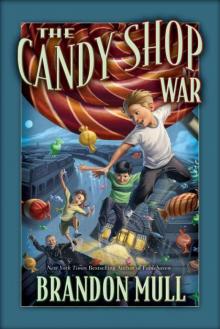 The Candy Shop War
The Candy Shop War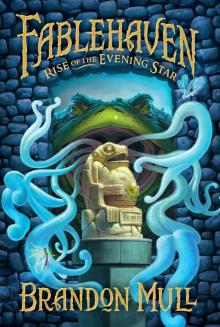 Rise of the Evening Star
Rise of the Evening Star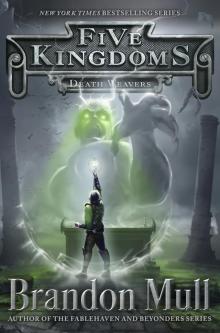 Death Weavers
Death Weavers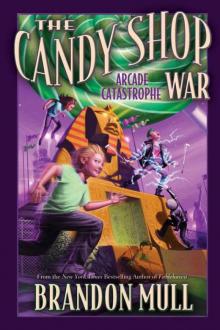 The Candy Shop War, Vol. 2: Arcade Catastrophe
The Candy Shop War, Vol. 2: Arcade Catastrophe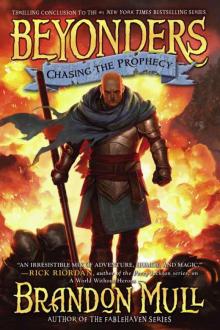 Chasing the Prophecy
Chasing the Prophecy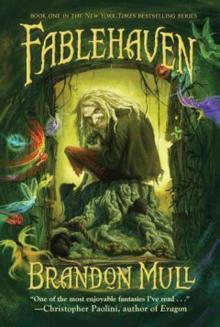 Fablehaven
Fablehaven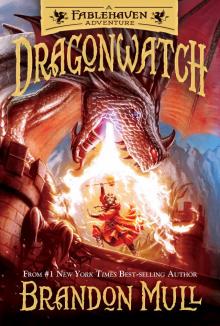 Dragonwatch
Dragonwatch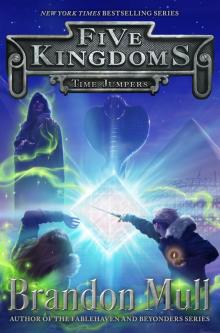 Time Jumpers
Time Jumpers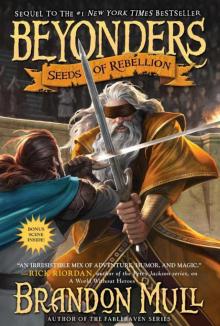 Seeds of Rebellion
Seeds of Rebellion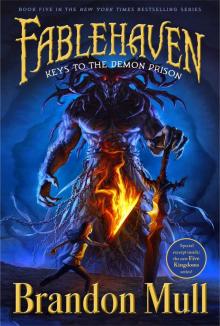 Keys to the Demon Prison
Keys to the Demon Prison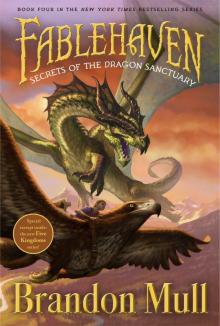 Secrets of the Dragon Sanctuary
Secrets of the Dragon Sanctuary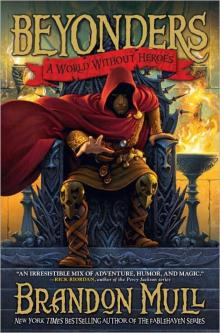 A World Without Heroes
A World Without Heroes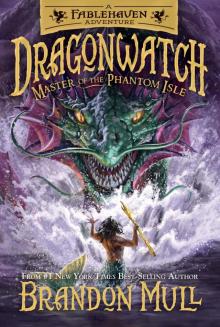 Master of the Phantom Isle
Master of the Phantom Isle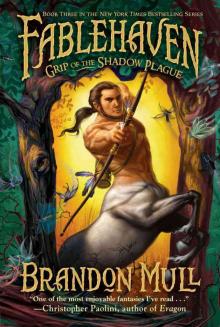 Grip of the Shadow Plague
Grip of the Shadow Plague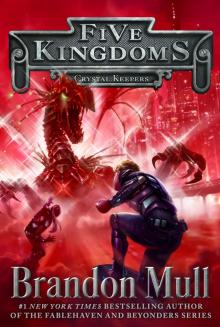 Crystal Keepers
Crystal Keepers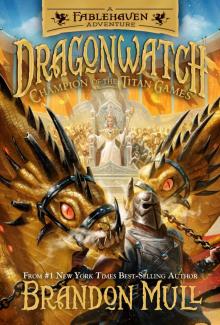 Champion of the Titan Games
Champion of the Titan Games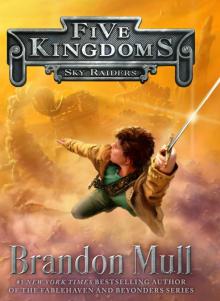 Sky Raiders
Sky Raiders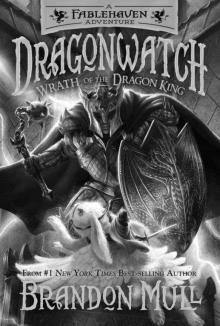 Dragonwatch, Book 2: Wrath of the Dragon King
Dragonwatch, Book 2: Wrath of the Dragon King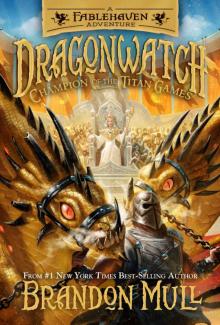 Dragonwatch, vol. 4: Champion of the Titan Games
Dragonwatch, vol. 4: Champion of the Titan Games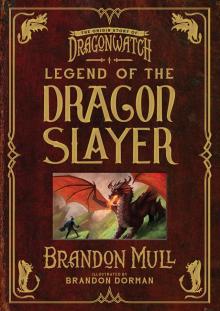 Legend of the Dragon Slayer
Legend of the Dragon Slayer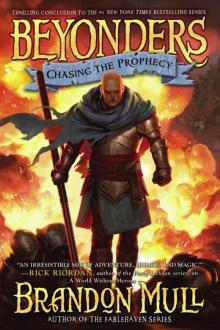 Chasing the Prophecy (Beyonders)
Chasing the Prophecy (Beyonders)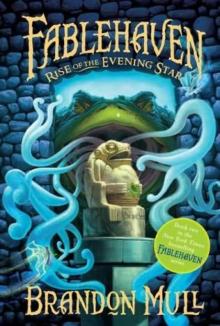 Fablehaven2-Rise of the Evening Star
Fablehaven2-Rise of the Evening Star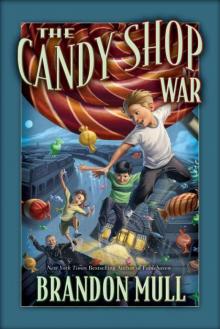 Candy Shop War
Candy Shop War Wild Born
Wild Born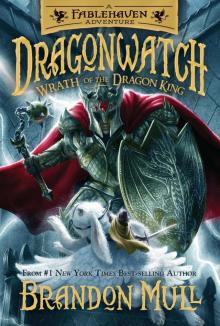 Wrath of the Dragon King
Wrath of the Dragon King Spirit Animals Book 1: Wild Born
Spirit Animals Book 1: Wild Born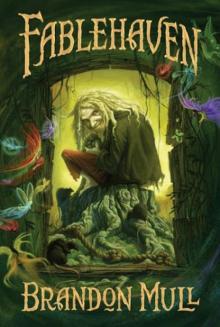 Fablehaven1-Fablehaven
Fablehaven1-Fablehaven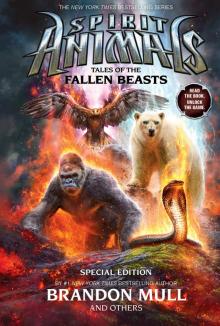 Tales of the Fallen Beasts
Tales of the Fallen Beasts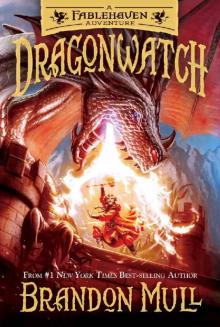 Dragonwatch: A Fablehaven Adventure
Dragonwatch: A Fablehaven Adventure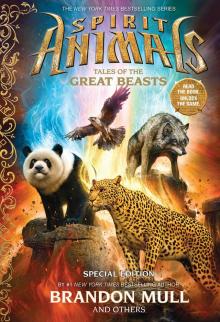 Tales of the Great Beasts
Tales of the Great Beasts